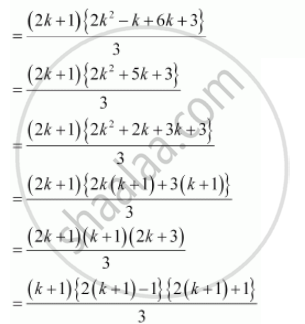Advertisements
Advertisements
प्रश्न
Prove the following by using the principle of mathematical induction for all n ∈ N:
उत्तर
Let the given statement be P(n), i.e.,


Thus, P(k + 1) is true whenever P(k) is true.
Hence, by the principle of mathematical induction, statement P(n) is true for all natural numbers i.e., n.
APPEARS IN
संबंधित प्रश्न
Prove the following by using the principle of mathematical induction for all n ∈ N: 1.2.3 + 2.3.4 + … + n(n + 1) (n + 2) = `(n(n+1)(n+2)(n+3))/(4(n+3))`
Prove the following by using the principle of mathematical induction for all n ∈ N:
Prove the following by using the principle of mathematical induction for all n ∈ N:
(1+3/1)(1+ 5/4)(1+7/9)...`(1 + ((2n + 1))/n^2) = (n + 1)^2`
Prove the following by using the principle of mathematical induction for all n ∈ N: n (n + 1) (n + 5) is a multiple of 3.
Prove the following by using the principle of mathematical induction for all n ∈ N: x2n – y2n is divisible by x + y.
If P (n) is the statement "n2 + n is even", and if P (r) is true, then P (r + 1) is true.
\[\frac{1}{1 . 2} + \frac{1}{2 . 3} + \frac{1}{3 . 4} + . . . + \frac{1}{n(n + 1)} = \frac{n}{n + 1}\]
1 + 3 + 5 + ... + (2n − 1) = n2 i.e., the sum of first n odd natural numbers is n2.
\[\frac{1}{3 . 5} + \frac{1}{5 . 7} + \frac{1}{7 . 9} + . . . + \frac{1}{(2n + 1)(2n + 3)} = \frac{n}{3(2n + 3)}\]
\[\frac{1}{3 . 7} + \frac{1}{7 . 11} + \frac{1}{11 . 5} + . . . + \frac{1}{(4n - 1)(4n + 3)} = \frac{n}{3(4n + 3)}\]
2 + 5 + 8 + 11 + ... + (3n − 1) = \[\frac{1}{2}n(3n + 1)\]
12 + 32 + 52 + ... + (2n − 1)2 = \[\frac{1}{3}n(4 n^2 - 1)\]
32n+2 −8n − 9 is divisible by 8 for all n ∈ N.
(ab)n = anbn for all n ∈ N.
n(n + 1) (n + 5) is a multiple of 3 for all n ∈ N.
72n + 23n−3. 3n−1 is divisible by 25 for all n ∈ N.
Prove that n3 - 7n + 3 is divisible by 3 for all n \[\in\] N .
7 + 77 + 777 + ... + 777 \[{. . . . . . . . . . .}_{n - \text{ digits } } 7 = \frac{7}{81}( {10}^{n + 1} - 9n - 10)\]
\[\frac{(2n)!}{2^{2n} (n! )^2} \leq \frac{1}{\sqrt{3n + 1}}\] for all n ∈ N .
x2n−1 + y2n−1 is divisible by x + y for all n ∈ N.
\[\text{ Let } P\left( n \right) \text{ be the statement } : 2^n \geq 3n . \text{ If } P\left( r \right) \text{ is true, then show that } P\left( r + 1 \right) \text{ is true . Do you conclude that } P\left( n \right)\text{ is true for all n } \in N?\]
\[\text{ A sequence } a_1 , a_2 , a_3 , . . . \text{ is defined by letting } a_1 = 3 \text{ and } a_k = 7 a_{k - 1} \text{ for all natural numbers } k \geq 2 . \text{ Show that } a_n = 3 \cdot 7^{n - 1} \text{ for all } n \in N .\]
\[\text{ A sequence } x_0 , x_1 , x_2 , x_3 , . . . \text{ is defined by letting } x_0 = 5 and x_k = 4 + x_{k - 1}\text{ for all natural number k . } \]
\[\text{ Show that } x_n = 5 + 4n \text{ for all n } \in N \text{ using mathematical induction .} \]
Prove by method of induction, for all n ∈ N:
3 + 7 + 11 + ..... + to n terms = n(2n+1)
Prove by method of induction, for all n ∈ N:
(cos θ + i sin θ)n = cos (nθ) + i sin (nθ)
Answer the following:
Prove, by method of induction, for all n ∈ N
12 + 42 + 72 + ... + (3n − 2)2 = `"n"/2 (6"n"^2 - 3"n" - 1)`
Answer the following:
Given that tn+1 = 5tn − 8, t1 = 3, prove by method of induction that tn = 5n−1 + 2
Answer the following:
Prove by method of induction
`[(3, -4),(1, -1)]^"n" = [(2"n" + 1, -4"n"),("n", -2"n" + 1)], ∀ "n" ∈ "N"`
Prove the statement by using the Principle of Mathematical Induction:
4n – 1 is divisible by 3, for each natural number n.
Prove the statement by using the Principle of Mathematical Induction:
23n – 1 is divisible by 7, for all natural numbers n.
Prove the statement by using the Principle of Mathematical Induction:
n3 – 7n + 3 is divisible by 3, for all natural numbers n.
Prove the statement by using the Principle of Mathematical Induction:
For any natural number n, xn – yn is divisible by x – y, where x and y are any integers with x ≠ y.
Prove the statement by using the Principle of Mathematical Induction:
n3 – n is divisible by 6, for each natural number n ≥ 2.
Prove that for all n ∈ N.
cos α + cos(α + β) + cos(α + 2β) + ... + cos(α + (n – 1)β) = `(cos(alpha + ((n - 1)/2)beta)sin((nbeta)/2))/(sin beta/2)`.
If P(n): 2n < n!, n ∈ N, then P(n) is true for all n ≥ ______.
By using principle of mathematical induction for every natural number, (ab)n = ______.
